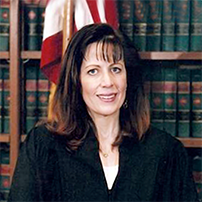Summer 2017 Newsletter |
|||||||||||
 |
|||||||||||
Family Violence • Domestic Violence • Integrated Domestic Violence • Elder Justice Initiative |
|||||||||||
|
|||||||||||
|
|||||||||||
|
In the months since our last newsletter was published in October 2016, our office has been hard at work launching the rollout of the Remote Access to Temporary Orders of Protection program – which is now active in 15 counties statewide with more counties to come – hosting our annual two-day domestic violence symposium at New York Law School in December, planning our Judicial Symposium on the Financial Exploitation of Older Adults at the Judicial Institute which was held on May 1, offering our firearms training to our DV and other judges statewide, and continuing to visit and support the DV and IDV courts throughout the state. We have also continued to lecture on domestic violence and elder justice issues at regional court meetings, universities, bar associations and other conferences. Our NYS Elder Justice Committee has continued to collaborate and devise ways to improve the way the court system addresses cases involving our state's older population. You can hear and read more about our Remote Access to Temporary Orders of Protection program on WNYC and City Limits by clicking on the links in this newsletter and on our website. “I was honored to have recently been selected to join NYC Mayor Bill de Blasio's Domestic Violence Task Force, which is comprised of experts from inside and outside of government to develop...a comprehensive citywide strategy to reduce domestic violence...” The Hon. Deborah A. Kaplan, I was honored to have recently been selected to join NYC Mayor Bill de Blasio's Domestic Violence Task Force, which is comprised of experts from inside and outside of government to develop, in 150 days, a comprehensive citywide strategy to reduce domestic violence, enhance pathways to safety and ensure effective enforcement to hold abusers accountable. I was also asked to join and chair the Education and Training subcommittee of the New York State Bar Association and Women's Bar Association of the State of New York Domestic Violence Initiative, tasked with helping to educate attorneys statewide about domestic violence, expanding the existing pool of volunteer attorneys for domestic violence victims, and making recommendations concerning pending or proposed legislation that seeks to protect domestic violence victims. Links to WNYC & City Limits article• www.wnyc.org/story/order-protection-judge-can-see-you-now-skype I encourage you to read more about the OFVC's initiatives in this newsletter and on our website. If you have any questions, comments or suggestions for the OFVC please feel free to send us an email at ofvc@nycourts.gov or call us at (646) 386-5540. Please visit our website at: www.nycourts.gov/courts/family-violence/index.shtml | |||||||||||
Update on the Rollout of the Remote Access to Temporary Orders of Protection Program |
|||||||||||
|
The Remote Access to Temporary Orders of Protection Program has been implemented in 15 counties statewide and new counties are being added each month. The OFVC's goal is to make this program available in all 62 counties across New York State within the next two years. |
|||||||||||
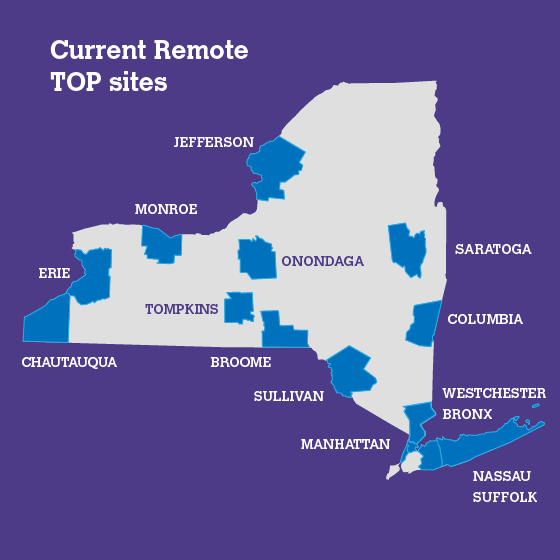 |
|||||||||||
Update from Suffolk County |
|||||||||||
|
On behalf of our District Administrative Judge C. Randall Hinrichs and Family Court Supervising Judge Theresa Whelan, we would like to extend our appreciation to the Hon. Deborah A. Kaplan, Statewide Coordinating Judge for Family Violence Cases and her office for their oversight and selection of Suffolk County as one of the first sites for this innovative and exceptional program. In only a few months, the Suffolk County Family Court has been able to reach litigants with unique situations that may have prevented them from obtaining a protective order because of an undue hardship or safety concern. The dynamic partnership with our dedicated domestic violence advocates and agencies has allowed the court to hear petitions from a 94-year-old woman from the far East End approximately 50 miles from the nearest courthouse; a victim with a cast on her foot/ankle and unable to drive was able to meet an advocate at her local library to file a petition and attend her first court appearance remotely; and an elderly woman who was able to get a protective order from her hospital bed due to the alleged actions of her abusive caretaker son. These are just a few examples of the potential this program has to improve access and reach even the most vulnerable populations. Recently, the Suffolk County Police Department and County Executive's Office implemented plans to supply the equipment and support for a DV advocate to work out of each precinct in order to prepare petitions and, if warranted, attend their court appearance via Skype. Due to Suffolk County's geographical size, volume and lack of public transportation, this project is making a hugely positive impact by enhancing services and eliminating possible safety concerns for the children and families of Suffolk County. This initiative addresses multiple issues affecting our family courts and provides long-term benefits to the court operationally by utilizing current technologies to improve our processes and access to the court for victims of domestic violence. By incorporating the use of pioneering court technologies, we have the ability to expand access to justice for all court users in an efficient and expedited manner. Feedback from Omar Russo, Victim Advocate, VIBS Family Violence and Rape Crisis Center, Suffolk County: “I wanted to take a moment and thank you all for your help in facilitating this and making it a reality. Not only did it seem to be an incredible success, but the entire process from start to finish went so smoothly and without a hitch. As promised I have feedback, which is all from my end positive. The connection, visibility and audio (incoming) was all 95-100% crystal clear. The timing was good, amazing compared to actually being in court. From 11:07AM (actually starting the petition with the client) to just after 1PM (finishing the entire process and handing the client her order). That is about two hours, which is just honestly unheard of. Myself and the other advocate that was present were both floored by the timing. The client was beyond satisfied and grateful, this was a tough case (details-wise) and this experience being positive for her seems to have made all the difference. On behalf of her as well, I can't thank you all enough for helping relieve a huge burden from an already victimized person. If you are interested in an exact quote from the client, more than once she said, ‘I can't believe this, that was so easy,' she told us that it was ‘so much less stressful' then she had been preparing herself for.” |
|||||||||||
Spotlight on IDV Courts: |
|||||||||||
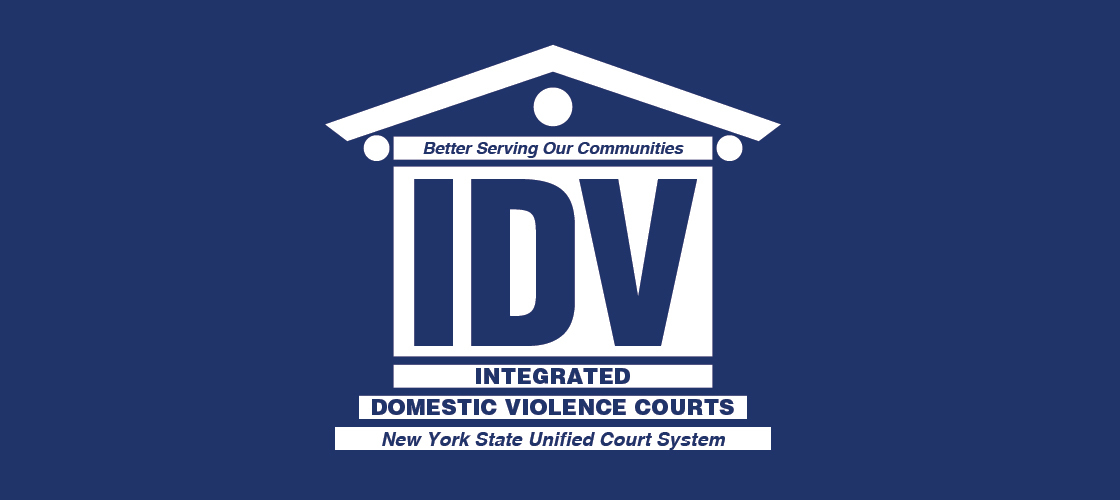 |
|||||||||||
|
The IDV Court is based upon the concept of one judge presiding over one family's criminal, family, and matrimonial proceedings. The IDV court model promotes court efficiency and informed judicial decision making, while providing “a comprehensive approach to case resolution.” There are several advantages of having one family appear before one judge, such as decreasing the number of court appearances for litigants, and streamlining the proceedings by eliminating inconsistent and conflicting judicial orders. Additionally, having one family appear in one court increases the judge's and counsels' familiarity with the specific issues facing the litigants and their families, thereby promoting a disposition tailored to their particular circumstances. New York County IDV CourtTandra L. Dawson, designated as an Acting Supreme Court Justice, has been the presiding judge in the New York County IDV Court since its opening in January 2007. In recognition of her continuing commitment to the fight against domestic violence, Judge Dawson received the In the Trenches Award in May 2016. The award was presented to her by the Honorable Deborah A. Kaplan at the 20th Annual Fordham Forum on Domestic Violence. Judge Dawson and the IDV Court staff work together as a team to provide professional, courteous, and efficient service to litigants and their families. Members of our court staff are experienced court personnel with backgrounds in Supreme Criminal and Family Court. All members of the court staff are cross-trained in all disciplines. Judge Dawson’s staff includes Linda Capitti, Esq., IDV Principal Court Attorney, Gail Fleming, IDV Court Coordinator and Associate Court Clerk, Sergeant Betty Santiago, Taryn Harris, Resource Coordinator, Senior Court Clerk John Montero, SCO Michael Napolitano and Court Officer Kerri-Ann Laird. Guided by Judge Dawson's example, the IDV Court staff strives to treat every litigant professionally and with respect. One of the objectives of the IDV Court is to provide access to justice for all litigants, while offering services to meet their families’ needs. In order to achieve this goal, relationships have been established with various community based social service providers. Among the types of programs currently available are: Batterer’s Intervention programs, Mental Health, Alcohol/Substance Abuse treatment programs, Parenting programs, Supervised Visitation programs, Victim Advocacy and Support, and Preventative programs. The Resource Coordinator plays an essential part in identifying and contacting local service providers, as well as maintaining relationships with our current service providers. |
|||||||||||
 |
|||||||||||
| Judge Tandra L. Dawson | |||||||||||
|
The IDV Court conducts regular meetings with community stakeholders in order to maintain an ongoing dialogue with existing local service providers. New York County IDV Stakeholder meetings are scheduled approximately three times each year and feature presentations on a variety of topics pertaining to issues that may arise in the IDV Court. Attorneys attending our stakeholder meetings often receive CLE credit, free of charge. |
|||||||||||
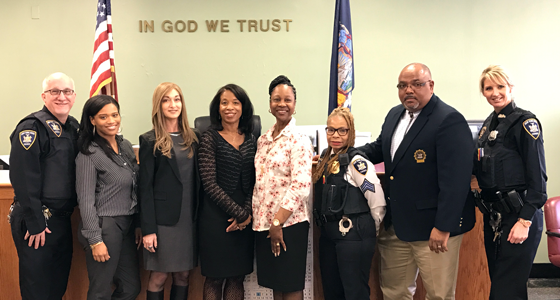 |
|||||||||||
| From left to right: SCO Michael Napolitano, Resource Coordinator Taryn Harris, Court Attorney Linda Capitti, Judge Tandra L. Dawson, IDV Coordinator Gail Fleming, Sgt. Betty Santiago, Senior Court Clerk John Montero, and Officer Kerri-Ann Laird. | |||||||||||
Westchester County IDV CourtHon. Susan M. Capeci and StaffThe Hon. Susan M. Capeci, A.J.S.C., presides over the Westchester County IDV Part and has been the sole Justice in that part since 2009. Prior to joining the bench, Justice Capeci was a practicing criminal defense attorney for over 25 years, handling all types of criminal matters. That experience has been invaluable in managing the high volume domestic violence criminal calendar. With respect to offender accountability, the Court monitors defendants' compliance with drug, alcohol and batterer's programs with the assistance of our Resource Coordinator, Jacqueline Green, who obtains information directly from the service providers as to the defendant's compliance, and reports this information directly to the Court upon the defendant's appearance. In high risk cases, the Court maintains a regular compliance calendar to ensure a defendant's compliance with court-ordered programs on a regular basis. Other critical staff in the Part include our court clerks, Anissa Robinson and Shawn Powell, and the Judge's secretary Donatella Runfola, who each work together seamlessly to ensure that the Part handles the large volume of cases transferred to it and the entry of orders of protection issued by the Court. The team is completed by myself as Principal Law Clerk to Justice Capeci; my role involves conferencing matrimonial and Family Court cases with attorneys and drafting Family Court custody and visitation orders, in addition to drafting decisions on motions and decisions after trial in Criminal Court, Family Court, and in Supreme Court matrimonial cases. The IDV Part is also served by a rotating staff of court reporters and court officers. |
|||||||||||
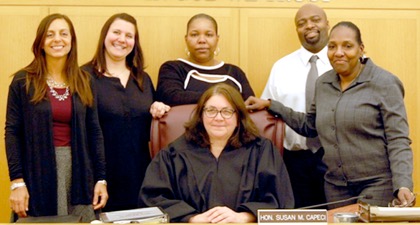 |
|||||||||||
| Standing from left to right, Ivy Ozer, Esq., Principal Law Clerk to Judge Capeci, Donatella Runfola, Principal Secretary to Judge Capeci, Anissa Robinson, Senior Court Clerk in the IDV Part, Shawn Powell, Senior Court Clerk in the IDV Part, and Jacqueline Green, Resource Coordinator in the IDV Part. | |||||||||||
Recent InitiativesRecognizing the increase in intimidation and harassment of victims through social media, GPS tracking, and other forms of cyberstalking, the Westchester IDV Part has collaborated with the Westchester County Department of Probation to update and modernize the conditions of probation for domestic violence offenses. These conditions of probation now include provisions specifically prohibiting defendants from accessing the victim's email or recorded messages, from gathering information about the victim from search engines and public profiles, from installing “spyware” which would allow the defendant to obtain information about the victim or track their internet use or installing malware to impersonate another for the purpose of contacting the victim, and from using GPS tracking devices on a victim's phone, computer or car. The updated conditions of probation for domestic violence offenses also mandate the defendant's compliance with firearms restrictions, with respect to possession and residing with anyone who possesses a firearm, in compliance with the NYS Safe Act. With regard to cyberstalking, Justice Capeci issued a decision, holding that a defendant's “tagging” of the victim in a Facebook post constituted a violation of the order of protection prohibiting the defendant from contacting the victim by electronic or other means. (People v Gonzalez [NYLJ 1202746987949, at 1, decided January 4, 2016]). In that case, the victim had received notice by email that she had been tagged by the defendant in an online posting on Facebook. Although the defendant argued that the order of protection did not specifically prohibit Facebook communication with the protected party, the Court found, on a motion to dismiss, that this conduct was sufficient for pleading purposes to establish a violation of the order of protection, since the victim was directly notified by email that she had been tagged in the Facebook posting by the defendant. The Westchester IDV Part continues to strive to utilize best practices and innovative approaches to domestic violence cases and is committed to continuing in this endeavor. We are delighted to have all of the training programs offered by the Office of the Statewide Coordinating Judge for Family Violence cases as an invaluable resource. |
|||||||||||
N.Y.S. Judicial Committee on Elder Justice Presents Elder Abuse Prevention Training |
|||||||||||
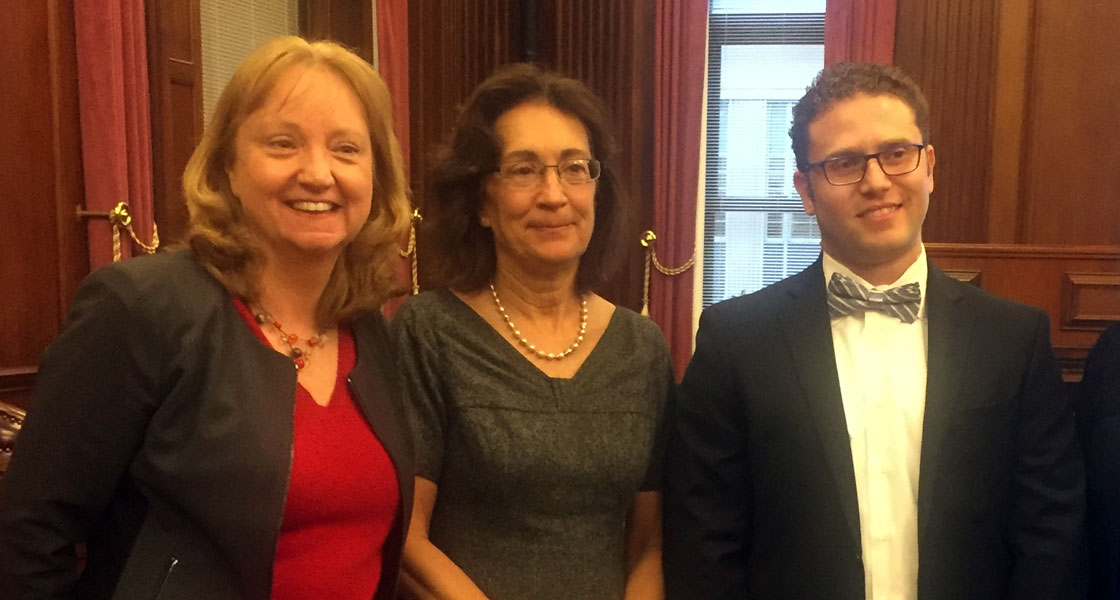 |
|||||||||||
| From left: Karen Nicolson, Justice Paula Feroleto, Dr. Steven Buslovich | |||||||||||
|
The Hon. Deborah A. Kaplan, Statewide Coordinating Judge for Family Violence Cases and Chair of the N.Y.S. Judicial Committee on Elder Justice, along with Elder Justice Committee members; Eighth Judicial District Administrative Judge Paula Feroleto, N.Y.S. Supreme Court Justice Ralph Boniello and Karen Nicolson, Executive Director of the Center for Elder Law and Justice, presented a program on October 27, 2016, entitled “Elder Abuse Prevention Training,” held in the Erie County Supreme Court Ceremonial Courtroom. More than 150 people including members of the judiciary, court staff, not-for-profit service providers, government agencies, academia, social workers, medical professionals, law enforcement, prosecutors, legal service attorneys, victim advocates and other members of the Bar attended this comprehensive, multi-disciplinary training. Judge Kaplan discussed the establishment of the New York State Judicial Committee on Elder Justice and its initiatives, noting that Chief Judge Janet DiFiore has made a continuing commitment to addressing issues facing the elderly population in the state. During the program, Judge Kaplan noted that Judges and all court personnel need to have a good understanding of the aging process and its effect on intellect, senses, movement, health and attitude. Education on these issues will be incorporated into training for OCA court employees at orientation. Judge Kaplan further noted that the highest rate of elder abuse is major financial exploitation of older adults. An OCFS study indicated that the annual costs of financial exploitation of the elderly in New York State is $1.5 billion dollars; often perpetrated by children and caregivers. “An OCFS study indicated that the annual costs of financial exploitation of the elderly in New York State is $1.5 billion dollars...” The program also included discussion of the need for continued education and a multi-systemic response to address the complex issues of elder abuse. Dr. Steven Buslovich, a geriatric specialist in Buffalo, explained the different mental health issues that members of the elderly population may face. Supreme Court Justice Ralph Boniello participated in a panel discussion and discussed the prevalence of elder abuse, which may involve nursing homes and caregivers, in addition to family members. Judge Kaplan's dedicated work on these issues was later recognized by the Western New York legal community on December 1, 2016 when she was named a “Champion of Justice” at the Volunteer Lawyer's annual celebration. |
|||||||||||
Justice Morgenstern Visits South Korea |
|||||||||||
|
The NYS Unified Court System was asked to send a jurist to participate in the Women's Human Rights Commission of Korea's 2016 Symposium on the Prevention of Domestic Violence, which was held in December. The goal of the symposium was to introduce New York State's Integrated Domestic Violence Court to the Korean legal community. The Hon. Esther M. Morgenstern, Presiding Justice of the Kings County IDV Court, a national mentor court, attended as OFVC’s representative. Below is her report. |
|||||||||||
 |
|||||||||||
| 2016 Seminar on the Prevention of Domestic Violence | |||||||||||
|
After arriving in South Korea, I met with the Presiding Judges of the Seoul Family Court, Hur, Boo-Yeol and Yang-Hee Kwon and several of the family court judges who serve on a rotating basis in visitation, custody and family offense parts. I reported to the assembled judges the importance of establishing and maintaining a domestic violence registry to assist in monitoring perpetrators of domestic violence as well as training and maintaining specialized parts within the Family Court focusing on domestic violence. |
|||||||||||
 |
|||||||||||
| 2016 Seminar on the Prevention of Domestic Violence | |||||||||||
|
My trip included a lecture to a group of 200 judges, law professors, prosecutors, defense attorneys, civil providers, police officers and social workers on the importance of developing protocols to deal with domestic violence cases in a way to ensure victim safety and defendant accountability. The audience was extremely motivated to adopt New York’s principles but expressed concerns about Korean societal norms, where domestic violence is seen as a “family matter.” I also met with the Deputy Chief U.S. Ambassador to South Korea, Marc E. Knapper, and Booyeon Lee Allen, an officer at the U.S. Embassy in Seoul, who were extremely interested in assisting the Korean community in achieving its goal of zero tolerance for domestic violence. The Human Rights Commission Director General, Byun Hyundai Ju, arranged for members of the press from the Edaily, Yohnap News Agency and International Kyunghayang Shinmum social policy desk to interview me and discuss all of the advances we have made in the battle to combat domestic violence. I also lectured to a law school class of advanced legal scholars who were training to become judges. I also had the opportunity to tour the Women's Human Rights Commission offices wherein they maintain a social service network akin to our Family Justice Centers where victims of all crimes can obtain information and services for their social service needs dealing with domestic violence, human trafficking, elder abuse, and abuse and neglect of children. |
|||||||||||
OFVC Hosts Judicial Symposium on the Financial Exploitation of Older Adults |
|||||||||||
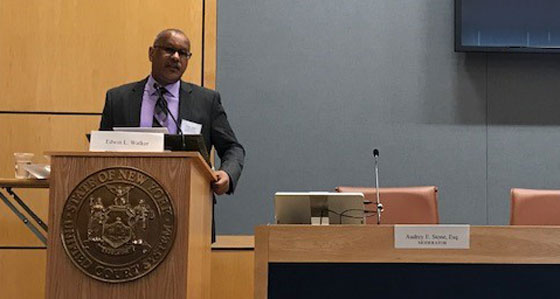 |
|||||||||||
| Edwin Walker, Deputy Assistant Secretary for Aging, Administration for Community Living, U.S. Department of Health and Human Services, delivers the Keynote Address | |||||||||||
|
Every year, thousands of New York's older adult population are the victims of some form of elder abuse and the highest rate of mistreatment involves major financial exploitation, depriving older adults of resources needed for basic necessities and the loss of a lifetime of savings. Recent data suggests that as many as one in 20 older adults were financially mistreated in the recent past. On May 1, 2017, the OFVC hosted a judicial symposium that provided an in-depth look into the many facets of financial exploitation of older adults. Each judicial district was asked to identify a team of judges and non-judicial staff from different courts to attend. The keynote address was delivered by Edwin Walker, Deputy Assistant Secretary for Aging, Administration for Community Living, U.S. Department of Health and Human Services. Symposium presenters included leading experts from across the country, from medical professionals to representatives from financial institutions. The symposium agenda included an Introduction to Financial Exploitation, interdisciplinary discussions at lunch facilitated by local experts, and a powerful presentation on The Aging Brain by Dr. Mark Lachs, Professor of Medicine, Weill Cornell, Co-Chief of Geriatrics and Palliative Medicine, and Director or Geriatrics, The New York Presbyterian Health Care System. Presenters included Gary Brown, NYS Attorney General’s Office, Arlene M. Markarian, Esq., Nassau County District Attorney’s Office, and Greg Olsen, MSW, Acting Director, New York State Office for the Aging. |
|||||||||||
 |
|||||||||||
| Introduction to Financial Exploitation session – from left, Audrey Stone, Gary Brown, Greg Olsen, Arlene Markarian | |||||||||||
|
In addition, the intersection between financial capacity and financial exploitation was explored, from both a clinical and legal standpoint and how capacity can be assessed. The presenters for this session were Dr. Winston Chiong, an MD, PhD, who is an Assistant Professor of Neurology at the University of California, San Francisco in the Memory and Aging Center and Dr. Daniel C. Marson, J.D., Ph.D, a clinical neuropsychologist and a licensed attorney who is a professor in the Department of Neurology at the University of Alabama at Birmingham. The third member of the panel was Deborah Holt-Knight, Deputy Commissioner of NYC Adult Protective Services. The OFVC is producing a monograph to commemorate the symposium, which will be available as an educational tool to participants and court personnel. |
|||||||||||
Argentinian Delegation of Judges and Lawyers Visit NYC IDV Courts |
|||||||||||
 |
|||||||||||
| From left: Alejandro Fernandez, Vanesa Ferrazuolo, Ana Casal, Gustavo Galante | |||||||||||
Improving Judicial Response to Domestic ViolenceIn November of 2016 a group of judges, prosecutors, public defenders and members of the Judiciary Council of Buenos Aires visited the New York City Courts to find new ways to improve the judicial response to domestic violence cases in Buenos Aires. The OFVC planned a challenging agenda for the two-day visit. We met the Hon. Esther Morgenstern from the Kings County Integrated Domestic Violence Court and observed proceedings in her court, visited the Center for Court Innovation and met with the Special Victims Bureau of the New York County District Attorney's Office. In 2009 Argentina enacted a law, to prevent, punish and eradicate physical, psychological and economic violence against women, in both private and public spheres. However, last year 290 women were killed in gender violence incidents in Argentina. Femicides are the last step in an escalation of actions of psychological and physical aggression. In the Judiciary of our city, two types of conduct are investigated and sanctioned which, generally, are the first step in gender violence: harassment and threats. Forty percent of these – about eight thousand court cases per year – are related to instances of violence against women. Besides that, transference of national ordinary justice to the City of Buenos Aires as established by the National Constitution of 1994 is already taking action. As a result of that, our justice system will have jurisdiction over more crimes and cases of violence against women treated in our courts will be incremented. So, it is clear for us that we have to be prepared to deal with these cases. The judicial branch at all levels is making efforts to end violence in Argentina. Prior to our visit, we had been working on addressing this major issue, searching for new strategies and tools. Our visit to New York helped us understand the essential role that the justice system plays in ending violence against women. The Autonomous City of Buenos Aires has many institutions working against domestic violence but efforts are partially wasted due to lack of coordination between them. One of the most important lessons we learned from our visits with Judges Kaplan and Morgenstern is the need for effective coordination among all stakeholders within the judicial system – a “court partners” meeting – and also among federal and state government agencies that deal with violence against women, namely through the establishment of work protocols. We became aware of the necessity to launch a space where the non-governmental organizations (NGOs) that provide social or legal services to survivors could meet with the public stakeholders in our city. Working together will expand and enrich victim services. This April we launched a collaborative space where governmental organizations and NGOs addressing the issue of violence against women in our city meet with the goal of establishing interinstitutional working protocols. We are also preparing a working group on this issue within the Judicial Branch, among judges, members of the Public Prosecutor's Office, public defense attorneys and members of the Judiciary Council. This group is intended to prepare recommendations, analyze sentences and propose innovative initiatives. The Judiciary Council of Buenos Aires already holds a community outreach program called “La Justicia con Vos” – Justice with You – with the purpose that neighbors get to know the roles of prosecutors, defenders and judges in the judicial process and the ways of access to justice. We are expanding the program to bring women the resources they have within the justice system to assert their rights in situations of violence. We are also implementing a United Nations campaign called “#QuéOnda” (What's Up) targeted to teens and young adults to raise awareness and preventing abuses when dating. Finally, as the major outcome of our visit, my office is establishing a body of attorneys to provide free legal aid to women from disadvantaged groups. It will start to operate inside a court building next June. This visit was very productive for all those who had the opportunity to participate but mainly – and most importantly – is benefitting the judicial response to women who face situations of gender violence. Official Delegation: Vanesa Ferrazzuolo, Member of Buenos Aires Council for the Judiciary; Juan Pablo Godoy Velez, Member of Buenos Aires Council for the Judiciary; Alejandro G. Fernandez, Member of Buenos Aires Council for the Judiciary; Luis Duacastella, Deputy Public Defender for Buenos Aires; Bibiana Birrel, Public Defender for Buenos Aires; Gustavo Galante, Secretary of Access to Justice from Buenos Aires Prosecutor Office; Genoveva Cardinali, Buenos Aires Prosecutor specializing in gender violence; Cristina Lara, Judge; María Luisa Escrich, Judge; Paula Vaca, Official from Buenos Aires Council for the Judiciary; Ana Casal, Secretary of Institutional Affairs of Buenos Aires Council for the Judiciary. |
|||||||||||
 |
|||||||||||
| From left: Audrey Stone, Ignacio Jaureguilorda, Cristina Lara, Ana Casal, María Luisa Escrich, Paula Vaca, Alejandro Fernandez, Javier Telias, Vanesa Ferrazuolo, Robyn Mazur, Genoveva Cardinali, Gustavo Galante, Juan Pablo Godoy Vélez, Lorena Birriel, Luis Duacastella | |||||||||||
|
To stay up to date on the OFVC, please visit our website at www.nycourts.gov/courts/family-violence/index.shtml To submit an article for publication, please contact Deanna J. Lucci, Assistant Deputy Counsel and newsletter editor, at dlucci@nycourts.gov. |
|||||||||||
 |
|||||||||||
